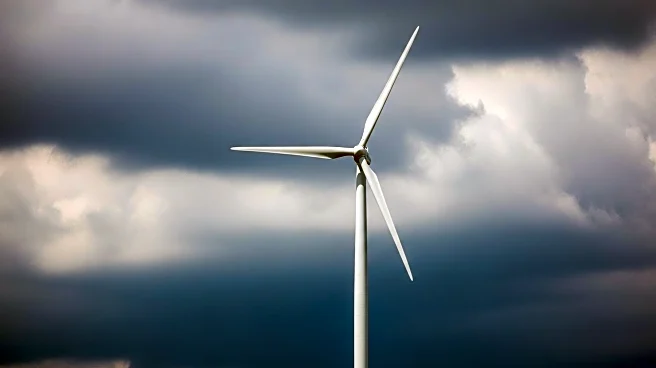What's Happening?
President Trump is urging world leaders to shift away from clean energy initiatives in favor of a resurgence in fossil fuels, led by the United States. Despite this push, countries like India are increasingly turning to renewable energy sources, finding them cheaper and more reliable than traditional gas-fired power plants. The International Energy Agency has reduced its forecast for renewable energy growth in the U.S., citing policy changes and the end of tax incentives. Meanwhile, global adoption of renewables is accelerating, with countries like China and India leading the charge. China has committed to significant solar and wind energy expansion, while India is moving away from idle gas plants in favor of renewables.
Why It's Important?
The shift in energy policy under President Trump could have significant implications for the U.S. economy and its position in the global energy market. By opposing clean energy technologies, the U.S. risks losing geopolitical influence and economic opportunities, especially as other countries continue to invest in renewables. The global transition to clean energy is seen as irreversible, with renewables expected to surpass coal as the largest source of electricity. This could lead to a trade deficit in clean energy manufacturing for the U.S., while countries like China capitalize on exporting these technologies. The U.S.'s focus on fossil fuels may provide short-term benefits but could hinder long-term economic growth and environmental sustainability.
What's Next?
The Trump administration's stance on clean energy may lead to further policy shifts and international negotiations, particularly with countries that are heavily investing in renewables. The U.S. may continue to push for fossil fuel expansion, potentially affecting trade relations and energy cooperation with other nations. As global electricity demand rises, the role of renewables is expected to grow, challenging the U.S.'s fossil fuel-centric approach. The administration's actions could prompt businesses and investors to reconsider their strategies, potentially leading to an exodus of clean energy projects from the U.S.
Beyond the Headlines
The broader implications of President Trump's energy policy include potential environmental and economic consequences. The resistance to clean energy could impact the U.S.'s ability to meet international climate goals and reduce greenhouse gas emissions. Additionally, the focus on fossil fuels may affect public health and environmental quality, as reliance on coal and gas continues. The cultural and ethical dimensions of this policy shift may also influence public opinion and political discourse, as stakeholders debate the merits of renewable versus fossil fuel energy.









